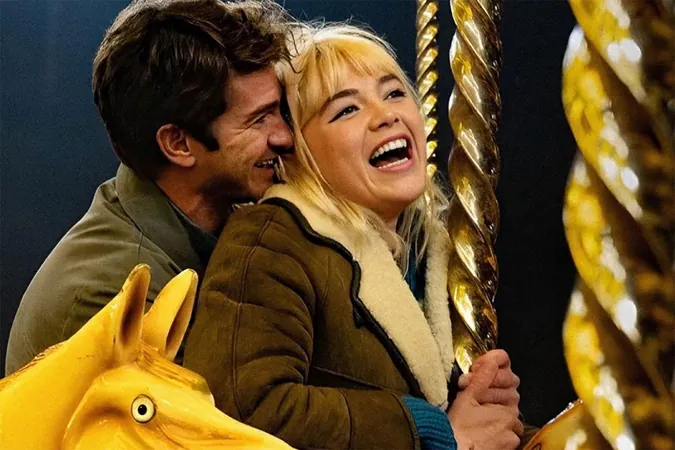
We Live in Time: The Wildly Ambitious Florence Pugh and Andrew Garfield Romance That Challenges Traditional Love Stories
2024-10-11
Author: Ming
Introduction
In a world where love stories often tread predictable paths, Florence Pugh’s latest feature, We Live in Time, goes off the beaten track with its bold narrative choices. According to Pugh, the film is centered on 'the simplest of things... we are here, for one reason only: to love and be loved.' Yet, what unfolds is anything but typical. With a premise that's both eccentric and poignant, this romantic drama is poised to capture attention—and perhaps controversy.
Spoiler Alert: Let’s Dive In.
The film, directed by John Crowley, intricately weaves through the relationship of Almut (played by Pugh) and Tobias (Andrew Garfield), exploring its evolution through three distinct, non-linear timelines. While it ostensibly focuses on Almut’s perspective, the movie does a delightful dance between contemporary and traditional romance themes, aiming to construct a fresh take on familiar tropes. Pugh describes it as a film that could resonate deeply with its audience—hinting that it might even become a lasting classic.
Almut is a modern, career-oriented woman who’s unapologetically clear about her stance on children, declaring her disinterest shortly after meeting the charming but traditional Tobias. Their chemistry is palpable, yet fraught with tension as Tobias's desire for a family clashes with Almut's aspirations. A standout moment occurs when Tobias admits, “I’m worried there’s a very distinct and real possibility that I am about to fall in love with you,' met with Almut’s incredulous rebuttal—setting the stage for a relationship marked by deep love and stark differences.
A Depth of Emotion
When tragedy strikes with Almut's cancer diagnosis, the film's weight intensifies. Faced with drastic health choices, Almut's decision to have a partial hysterectomy sparks debate about autonomy and societal expectations. It's framed as a progressive choice, but as the narrative unfolds, it becomes evident that the film grapples with the implications of traditional gender roles and expectations. Critics have noted this duality, pointing out how the movie often flirts with progressive ideals while clinging tightly to the fabric of classic romantic tragedy.
As they navigate their tumultuous journey, particularly following Almut's heart-wrenching decisions, the film attempts to shed light on the fleeting nature of life and love. A whimsical charm underlies their story—a stark contrast to the inevitable pain awaiting them. Notably, moments of humor punctuate the narrative. An early scene, wherein Tobias is comically run over by Almut, and their chaotic labor experience, inject levity into the overarching somberness.
Performances and Emotional Impact
While Pugh and Garfield's performances are captivating, some scenes, particularly those dealing with Almut's illness, feel rushed or glossed over, thereby challenging the emotional depth that such intense topics warrant. Almut’s journey in the culinary world, an environment brimming with ambition, is compelling. However, it concludes rather ambiguously, leaving audiences to grapple with unresolved legacies and the fragility of human connections.
Conclusion
The film's conclusion—marking a significant moment where Almut opts for competition over conventional life milestones—raises questions about identity and maternal legacy. Does she really shape her daughter’s memories with her triumphs, or does she remain an ethereal figure, defined more by absence than presence? The evocative final scenes leave viewers pondering the weight of the mother-daughter bond, and the exhilarating yet heartbreaking reality of living boldly.
In We Live in Time, we find a unique exploration of love's complexity wrapped in unconventional storytelling. It’s a film that boldly questions the norms of romance while striving to deliver a heart-wrenching emotional impact. Can it transcend the limitations of genre, or does it fall prey to those very conventions it seeks to critique? One thing is certain: this film is sure to ignite conversations about love, loss, and everything in between—making it a must-watch this season!


 Brasil (PT)
Brasil (PT)
 Canada (EN)
Canada (EN)
 Chile (ES)
Chile (ES)
 España (ES)
España (ES)
 France (FR)
France (FR)
 Hong Kong (EN)
Hong Kong (EN)
 Italia (IT)
Italia (IT)
 日本 (JA)
日本 (JA)
 Magyarország (HU)
Magyarország (HU)
 Norge (NO)
Norge (NO)
 Polska (PL)
Polska (PL)
 Schweiz (DE)
Schweiz (DE)
 Singapore (EN)
Singapore (EN)
 Sverige (SV)
Sverige (SV)
 Suomi (FI)
Suomi (FI)
 Türkiye (TR)
Türkiye (TR)